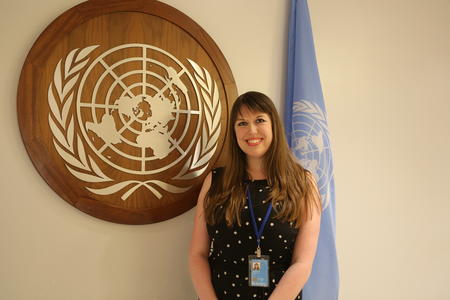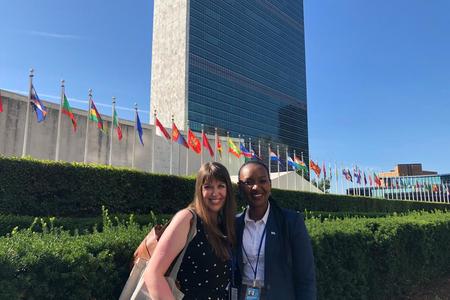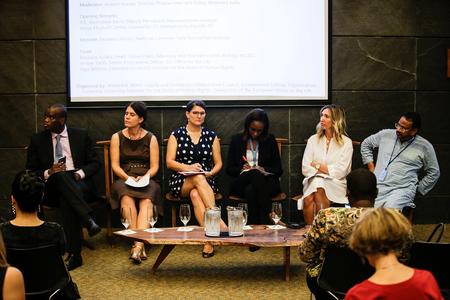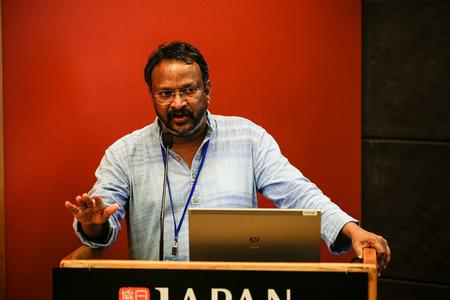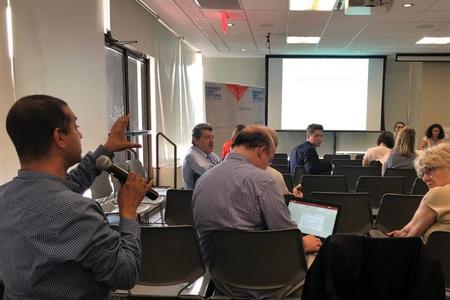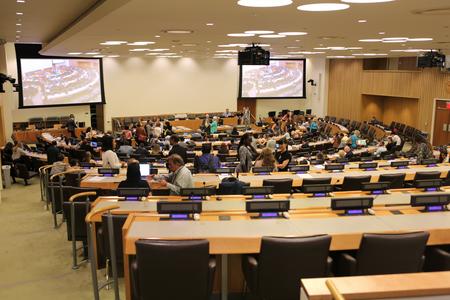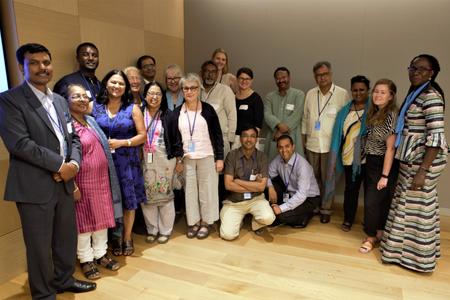Diary blog: WaterAid at the High Level Political Forum 2019

19 July
Yesterday marked the end of the 2019 High-Level Political Forum (HLPF). I joined for the second (final) week – the Voluntary National Review (VNR) part, when governments (including UK Government) reported against their progress on the global goals. And what a week it has been! After an energising and inspiring week, here are some of my initial reflections.
Solidarity
It was motivating to see civil society (and other stakeholders) from countries all over the world join together to hold their governments to account on the Sustainable Development Goals (SDGs), including Goal 6 – in front of other governments. Too often UN processes can appear slightly bewildering, but my time here this week has certainly demystified HLPF. This process is a key opportunity for civil society to hold national governments to account on their global commitments.
Urgency
There was a strong sense from civil society, including from young people, and many governments, that efforts to achieve the SDGs need to be intensified – more needs to be done, faster. This includes on tackling inequalities and addressing climate change- issues that water, sanitation and hygiene (WASH) has strong synergies with.
Silence on sanitation
The majority of conversations on WASH I’ve heard have focussed on water. This is welcome, but much less attention has been paid to sanitation, despite the fact that global progress on sanitation is lagging behind targets. Similarly, hygiene is not a big part of conversations. This is concerning. As global attention turns to the UN General Assembly and the UN Climate Summit in September, we’ll have to work hard to remind governments that ALL aspects of WASH are crucial to sustainable development, including to climate resilience.
Accountability
While it is encouraging that so many countries submitted their VNRs, the quality and presentation of the reports varied enormously. Although reports were subject to peer examination (questions from other countries) and from civil society, government ministers could easily avoid both sets of questions (this was the case with the UK). These reporting structures should be strengthened so that the VNR process can command more accountability from governments.
Overall, an inspiring week – lots of progress has been made, lots still to do!
- Bethan Twigg, UK Advocacy Coordinator, WaterAid UK @b_twigg
18 July: What does it mean to leave no one behind?
If you were keeping a tally of the most common phrases heard in UN conference rooms this week, “Leave no one behind” would be a seriously high scorer. A pretty indisputable principle, this pledge sits at the heart of member states’ commitment to the 2030 Agenda. But how to go about actually achieving this well-known catchphrase has been high on my mind during my first visit to New York, including during the Rwandan government’s Voluntary National Review (VNR) presentation yesterday.
Nine years since water and sanitation were declared human rights in this very building, it is shocking that a huge proportion of the global population have been left behind in this pursuit, because of their lack of finances, gender, history, age, geography, disability etc.
At WaterAid Rwanda, we believe that in order to solve the problem you must understand the full context. So, we’ve put a lot of effort into examining who is at high risk of being left behind and using this to design our interventions. And, for us, partnerships have been at the core of this process. We’ve been working with local districts in WASH service delivery, and with the Ministry of Health and Ministry of Education on policy coherence. A multi-sector dialogue on menstrual hygiene management recently brought on board students and women from rural areas, enabling them to share their challenges with decision makers. We were all challenged and it helped better inform our implementation plans.
Yesterday, the Rwandan Government presented its VNR. Of course, there is still a lot of work to do. But there was real honesty throughout the session. They laid out a commitment to work together, a choice to be accountable to themselves, and a desire to think big.
And it’s cross-sectoral collaboration that is going to help Rwanda achieve this. It’s opening spaces to those who are marginalised and disadvantaged, listening to the problems they express, and facilitating their participation in the solutions. That’s how we go about truly leaving no one behind.
It's another packed day of #VNR presentations at #HLPF2019, with govts highlighting both the progress they've made, and the challenges that lie ahead on the road to 2030.
Watch @VestineRda's response to how the #Rwanda 🇷🇼 government are tracking towards their #SDG promises 📽️ pic.twitter.com/vBvBpOWTGC— WaterAid Internat'l (@wateraid) July 17, 2019
- Vestine Mukeshimana, Head of Policy Research and Advocacy at WaterAid Rwanda @VestineRda
And as quickly as it came around, the 2019 HLPF is nearly over! We’ll be sharing our final round-up in the coming days.
17 July: Two fresh arrivals and two Voluntary National Reviews
The start of the second week of HLPF brought with it the arrival of more than 100 ministerial-level officials, 47 governments gearing up to share their SDG progress… and two new WaterAid delegates!
Vestine Mukeshimana, Head of Policy and Advocacy in Rwanda, and Bethan Twigg, UK Advocacy Coordinator (both pictured below), arrived in time for their respective governments’ Voluntary National Review (VNR) presentations.
With little time to get over the jetlag, they eagerly joined side events on financing, democracy and stakeholder engagement, jumped straight into coordinating with their civil society counterparts and actively participated in a Leave No One Behind workshop.
But the main focus of this week is clear: how are governments tracking towards their SDG promises?
Before having their time in the spotlight, the freshly arrived ministers were reminded of the stark reality of just how much work lies ahead, in a passionate keynote speech on Tuesday morning by Antonio Guterres, UN Secretary-General.
We are not yet on track and must step it up… Inequality between and within countries is disturbingly high.
Guterres also took the opportunity to link HLPF to the series of high-level meetings that await world leaders at the UN General Assembly in September. Pertinently, he asked them not to arrive with “beautiful speeches”, but with clear actions, plans and commitments for how they are implementing the 2030 Agenda.
Indeed, it was a piece of advice that we wish the first presenting governments of the VNRs had immediately heeded! While there were encouraging signs of some country-specific progress, the words of Yolanda Jobe’s powerful speech last week still echoed in the conference room: “If you think you are doing enough, do more… if you think you are moving fast, move faster!”
Here’s Dedo Mate-Kodjo, Regional Advocacy Manager for West Africa, and Bethan, reflecting on the Burkina Faso and UK presentations specifically.
Following the UK’s 🇬🇧 #VNR presentation at the #HLPF2019 , Advocacy Coordinator @b_twigg calls for a clear action plan on how the #SDGs will be implemented both domestically and abroad.
Watch here 👇 pic.twitter.com/judfsL6iDI— WaterAid Internat'l (@wateraid) July 16, 2019
And so on we go… With just a few days left of HLPF we’re feeling more determined than ever to ensure our message rings out loud and clear: continuing at current rates of progress just isn’t an option. Governments need to act urgently if we are to come anywhere near achieving the SDGs.
- Maisie-Rose Byrne, Advocacy and Campaigns Officer, WaterAid UK @MazzleRo
13 July: Stand out and be counted – you can be on the right side of history
Last week was another milestone in the history of the Sustainable Development Goals (SDGs). Governments have concluded the first full cycle of review of the SDGs at the High-Level Political Forum (HLPF) in New York. Sadly, as reported by UN Secretary-General António Guterres in his annual progress report, we are off track on most of the goals, and we have even moved backwards on some, such as hunger.
I strongly believe that this does not have to be this way, and that change is possible. Or, rather, we don’t have any option but to urgently change course for the sake of people, peace, security and prosperity.
My three takeaways so far:
1. We need structural and systemic changes – a bold shift in global governance.
This means a drastic shift in our current economic model, which focuses on growth at the cost of the planet and the future generation.
We need to democratise the global economic decision-making model. Measuring growth should include the cost to the planet. The gap between the top and the bottom must be addressed. International financial institutions and private sector need to address their internal dichotomies and walk the talk.
We had an encouraging 1st week @UN for #HLPF! Week 2 now & we look forward to 47 countries reporting on their #SDGs progress. Let's make sure leaders keep their promises to the world's poorest✊
Here's Campaigns Director @SavioConnects on 3 changes we want to see (not those 3)🍿 pic.twitter.com/bAiA9Tu8A9— WaterAid Internat'l (@wateraid) July 15, 2019
2. At the national level, states must invest in good governance.
This includes strong and transparent institutions; engagement of people at all levels; ability to increase income from domestic sources; and prioritising resource allocations to essential services – good education, healthcare, clean water and decent sanitation.
3. Finally, the silver bullet – we need to ensure human rights and other agreed international instruments sit at the very core of the delivery end of the SDGs.
This includes integration between goals and with existing international mechanisms. Anything else is tinkering on the edges and is business as usual – and that is not working.
The time is up! We need our political and business leaders, UN agencies and their staff, international financial institutions and those engaged in macroeconomics to show courage and act with a sense of urgency and purpose.
If you do this, you will be remembered for being on the right side of history.
- Savio Carvalho, Global Campaigns Director, WaterAid UK @SavioConnects
11 July: A plea for action
Well, Thursday was an intense third day at the High-Level Political Forum!
Together with Water Supply and Sanitation Collaborative Council (WSSCC), International Labour Organization (ILO), the European Union and Columbia University Institute for the Study of Human Rights, we hosted a side event focusing on SDG targets for decent work, inequality and peaceful societies and human rights.
We had an exciting panel, each panellist coming with a variety of experiences and perspectives. Amber Barth from ILO focused on ILO conventions and how they need to be linked to the Sustainable Development Goal (SDG) framework; Rockaya Aidara from WSSCC opened with powerful testimonies from women from different parts of Africa, before focusing on the challenges working women face around WASH and lack of menstrual hygiene facilities; and Inga Winkler from Columbia University built on Rockaya’s argument to propose what a menstrual hygiene framework would look like.
We also had Abdoulaye Barrow, Deputy Permanent Representative of Senegal to the UN, who highlighted the challenges around providing social protection to informal labourers, and Senegal’s efforts in this regard. Finally, Helge Zeitler, representing the EU delegation to the UN, talked about the EU’s human rights guidelines and how they provide a framework to decent work.
A key highlight for me was going beyond these questions of universal access to really focus on the plight and rights of those who provide these services – in particular, the women, men and children all around the world who are forced daily to clear latrine pits by hand in order to earn a living. Our keynote speaker Bezwada Wilson, from India’s Safai Karmachari Andolan – a movement for the rights of manual scavengers and sanitation workers – gave a passionate plea for wider acknowledgement and action around this issue, not just from the wider civil society but also from the member states sitting just across the road, inside the UN headquarters.
Savio, WaterAid’s Global Campaigns Director and our lead for the HLPF, summed it up aptly to the room. He pointed out that collectively we have two choices: 1) to return home and forget about what we’ve each heard today, or 2) to call on member states with renewed vigour to do something concrete about these issues, once and for all.
And for us here at WaterAid, the first option is simply not an option at all.
- Avinash Kumar, Director of Programmes and Policy, WaterAid India @Avinashkoomar
10 July: Releasing funding sources to finance the goals
Today at the HLPF we had the opportunity for some in-depth thinking about where our work fits in the broader landscape of both sustainable development and addressing inequalities (a main focus of this year’s session).
Several of our delegation joined a discussion this morning on the role of fiscal policy in achieving SDG 10 (reducing inequalities) organised by The United Nations Research Institute for Social Development and German political foundation Friedrich-Ebert-Stiftung. We engaged in this broad-reaching conversation about taxation, private vs. public sources of financing and the impact of increasing levels of debt on governments’ ability to provide the kinds of services and infrastructure that meaningfully improve people’s lives and wellbeing.
When these services aren’t available, it’s people living in poverty and facing discrimination – especially women and girls – who pay the price. UN Women’s Shahra Razavi termed this a “reproductive tax” that relies on women’s physical labour to fill the gaps of absent piped water systems, for example.
A representative of the International Trade Union Confederation shared that 10% of global GDP currently sits in tax havens. If even a fraction of those resources were instead harnessed as domestic revenue or international assistance, how much closer could we be to our goals?
These policy questions have clear implications for WaterAid, in that they affect the ability of governments of countries in which we work to extend access to WASH for their hardest to reach populations. Current structures of economic and financial governance also constrain the available resources for public provision of infrastructure and services.
Tomorrow we’ll share concrete examples of how WASH and inequalities intersect from WaterAid India and Sierra Leone. We’re looking forward to hearing from our colleagues, both now and when they return home, about how their engagement in these global policy discussions informs their interactions with their governments, including ministries in charge of water, sanitation and infrastructure and sectoral leads on health and education, and also finance and economic planning departments. As we heard reinforced today, budgetary allocation at national level and the global financial decision-making that shapes it are key factors in determining who has access to services like WASH and who doesn’t. It’s up to us to determine how we influence this conversation, throughout the HLPF and, more importantly, once it concludes.
- Katie Tobin, Advocacy Coordinator, WaterAid UK in New York @travelingKT
9 July: Energy, enthusiasm and frustration … where will it all lead?
And we’re off! Our delegates have hit the ground running in week one of HLPF. Here’s the lowdown on all the key moments.
We spent Sunday hosting a workshop with more than 70 members of civil society organisations – a rare but vital opportunity to come together ahead of the HLPF to discuss our collective approach. It was inspiring and energising to see fellow activists from so many diverse areas in the room – and we were able to build on these important discussions at the MGoS meeting the next day.
Tuesday marked the official start of the HLPF. We joined about 800 other delegates at the opening ceremony, where it’s fair to say that the same message rang out loud and clear – that, while there has been some progress around the SDGs, there hasn’t been nearly enough. As the Under-Secretary-General of Economic and Social Affairs of the UN put it, “The clock is ticking – the most vulnerable people and countries continue to suffer the most. The global response so far has not been ambitious enough,” and “It['s] time to step up our efforts to achieve empowerment, inclusion and equality to achieve the SDGs.”
But it was without doubt Yolanda Jobe from Island PRIDE who stole the show. To a room packed with government officials, she said, “Today I look out to this room and I see power… the world doesn’t need any more power…what we need is courage.” Her address was received with rapturous applause and cheers from the audience, unusual for such an official UN event.
It was good to see the plenary sessions centred around the ‘Leave no one behind’ theme, even though discussions were largely centred around economic equality, which is very important but inequality needs to be looked at through social and cultural dimensions as well.
Our afternoon strategy session on sanitation workers brought this out sharply. WaterAid hosted an event on the global issue of manual scavenging – in which women, men and children are forced to clear human waste from pits and sewers as a means of earning living. We were so pleased to facilitate this important discussion – it is time we focused a lot more on these dimensions of inequality when we look at access to water, sanitation and hygiene (WASH), and it’s absolutely vital that we ensure sanitation workers are represented in the SDGs.
And that brings us to the end of day one at HLPF. Overall it was a strong start to what promises to be an interesting ten days. But what’s on all of our minds here at WaterAid is whether this sense of frustration at the lack of progress will translate into action.
Let’s see what Wednesday brings.
- Lou Brydges, Senior Communications Project Officer, WaterAid UK
